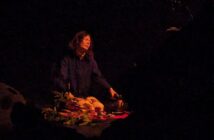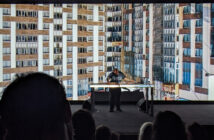Seun Kuti and the Egypt 80 band killed it. Any concerns I had before the show that Afrobeat might be a bit weird in the Opera House Concert Hall evaporated within the first minute of the show. This band was so good I’m sure they could convert just about any venue into an extension of the Shrine, the Lagos venue where two generations of Kutis and their band have perfected their groove over several decades.
The show began by offering a kind of primer in Afrobeat, the musical style pioneered by Fela Anikulapo Kuti in the 1970s which his son Seun is now faithfully reproducing. One by one, members of the band were introduced by MC and baritone sax player Adedimeji Fagbemi, starting with the three percussionists, then the other five members of the rhythm section, then the four-piece horn section, and finally the two backup singers/dancers. With each introduction, a new layer of the groove was added. This gradual start was very effective in attuning the audience’ ears and eyes to the contributions of everyone on stage – no mean feat with a 14 piece band. On its own, each part was deceptively simple, but the powerful groove they eventually created was so much more than the sum of its parts. It was fire, basically … and had me and many others smiling uncontrollably and shaking our heads in incredulity well before we got a glimpse of Kuti himself.
Indeed, Kuti was so confident in his band’ ability to win the audience over that he let them play for almost 15 minutes before he appeared on stage. Dressed like a fly-boy from 1970s Lagos in a shiny matching-shirt-and-pants outfit, he then led the band into a long version of Army Arrangement. This track was dedicated to Fela, who wrote it in the 1980s after one of his numerous arrests at the hands of Nigerian military regimes. By the end of it, the entire audience was on its feet. Most of us stayed that way for the rest of the show, and we sang along as instructed while Kuti made his way through extended versions of several tracks from his current album Many Things.
Virtually all of these songs lasted for fifteen minutes or so. In classic Afrobeat style, each contained several slowly-built cresendos, as initial grooves intensified through extended solos, the gradual layering of parts, percussion breaks of doom, and call-and-response interactions between Kuti and his horns, back-up singers and audience. The drama of these arrangements was accentuated by Kuti’ performance, as he acted out lyrics, played energetic solos and urged on other soloists, and directed the rhythm section dynamics. Through it all, the groove was paramount – the instrumental solos, for example, seemed much less about displaying individual virtuosity in a “jazz’ kinda way, and much more about providing the band with an excuse to get inside a groove and maximise its intensity over several minutes.
As the frontman, Kuti could easily have been overwhelmed by a band this powerful, or only maintain his leadership by keeping other band members permanently in the shadows. He did neither, having the charisma to be the focus of the performance in some moments, and the confidence to drift into the background as part of the horn section in others. And while he has established a politically militant public persona through his lyrics and promotional appearances, his stage presence was also characterised by a sense of humour and mischief that is also strongly reminiscent of his father. This helped him make a connection with the audience, despite the fact most of the lyrics are in pidgin.
I suppose the only lingering question about Seun Kuti’ future as a performer concerns his contribution to on-going stylistic innovation. Interviewed for the Herald’ Metro before the show, Kuti asserted his love of traditional Afrobeat. While others like his brother Femi and Fela’ ex-drummer Tony Allen have incorporated elements of hip hop and house music into their styles, Seun has decided to stick with the core elements that Fela pioneered. This was even more apparent in performance than it is on the album. Live, the band could really stretch out the songs, and their sounds were not mediated by production effects as they are on disc.
But in the midst of the concert, the sheer pleasure shared by performers and audience alike made the question of stylistic innovation seem trivial. The music is just so heavy, it’s not hard to imagine why Fela’ old band members, his sons, and new generations of Lagos musicians can see little reason to change it up too much. Having read a little about the profound obstacles they have had to overcome in Nigeria to keep making this music, I feel pretty privileged to have been able to see them in action.
Kurt Iveson



